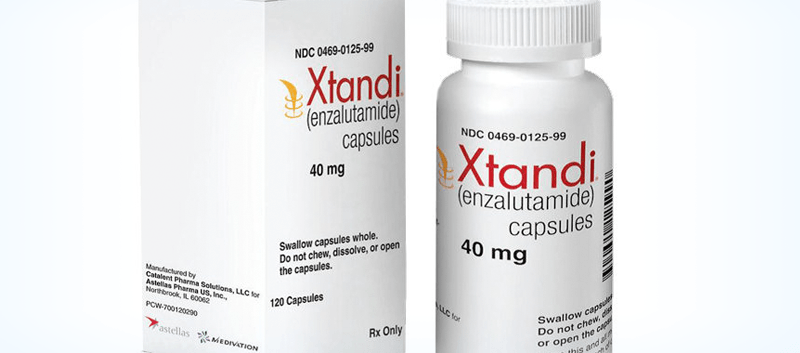FDA approves enzalutamide (XTANDI) for metastatic castration-sensitive prostate cancer

1/9/2020
“At UCA, we continue to drive state of the art care. As a clinical trial site, interested and qualifying patients had the opportunity to participate in the clinical trial which led to the recent FDA approval of Xtandi in newly diagnosed advanced prostate cancer patients.
This is an exciting time in the treatment of prostate cancer as every year our armamentarium for treatment in multiple stages of diseases grows. Now Xtandi is used in every variation of advanced prostate cancer. “ Joelle Hamilton, Medical Oncologist
On December 16, 2019, the Food and Drug Administration approved enzalutamide (XTANDI, Astellas Pharma Inc.) for patients with metastatic castration-sensitive prostate cancer (mCSPC).
FDA previously approved enzalutamide for patients with castration-resistant prostate cancer.
Efficacy was investigated in ARCHES (NCT02677896), a trial enrolling 1150 patients with mCSPC randomized (1:1) to receive either enzalutamide orally 160 mg once daily (N=574) or placebo orally once daily (N=576). All patients received a GnRH analog or had a prior bilateral orchiectomy.
The main efficacy outcome measure was radiographic progression-free survival (rPFS). Based on blinded independent central review, rPFS was defined as the time from randomization to radiographic disease progression at any time or death within 24 weeks after drug discontinuation. Radiographic disease progression was defined by identification of 2 or more new bone lesions on a bone scan with confirmation (Prostate Cancer Working Group 2 criteria) and/or progression in soft tissue disease. Time to new antineoplastic therapy was an additional endpoint.
Median rPFS was not reached (NR) in the enzalutamide arm compared to 19.4 months (95% CI: 16.6, NR) in the placebo arm (HR 0.39; 95% CI: 0.30, 0.50; p<0.0001). A statistically significant improvement was also reported on the enzalutamide arm compared to placebo in time to initiation of a new antineoplastic therapy (HR 0.28; 95% CI: 0.20, 0.40; p<0.0001). Overall survival (OS) data were not mature at the time of rPFS analysis.
The most common adverse reactions (≥ 5%) that occurred more frequently (≥ 2% over placebo) in enzalutamide-treated patients in ARCHES were hot flush, asthenia/fatigue, hypertension, fractures, and musculoskeletal pain.
The recommended dose is 160 mg (four 40 mg capsules) administered orally once daily, with or without food.
View full prescribing information for XTANDI.
This review used the Assessment Aid, a voluntary submission from the applicant to facilitate FDA’s assessment. This application was approved two weeks prior to the FDA goal date.
Enzalutamide was granted priority review. A description of FDA expedited programs is in the Guidance for Industry: Expedited Programs for Serious Conditions-Drugs and Biologics.
Healthcare professionals should report all serious adverse events suspected to be associated with the use of any medicine and device to FDA’s MedWatch Reporting System or by calling 1-800-FDA-1088.
For assistance with single-patient INDs for investigational oncology products, healthcare professionals may contact OCE’s Project Facilitate at 240-402-0004 or email OncProjectFacilitate@fda.hhs.gov.
Follow the Oncology Center of Excellence on Twitter @FDAOncologyExternal Link Disclaimer.
